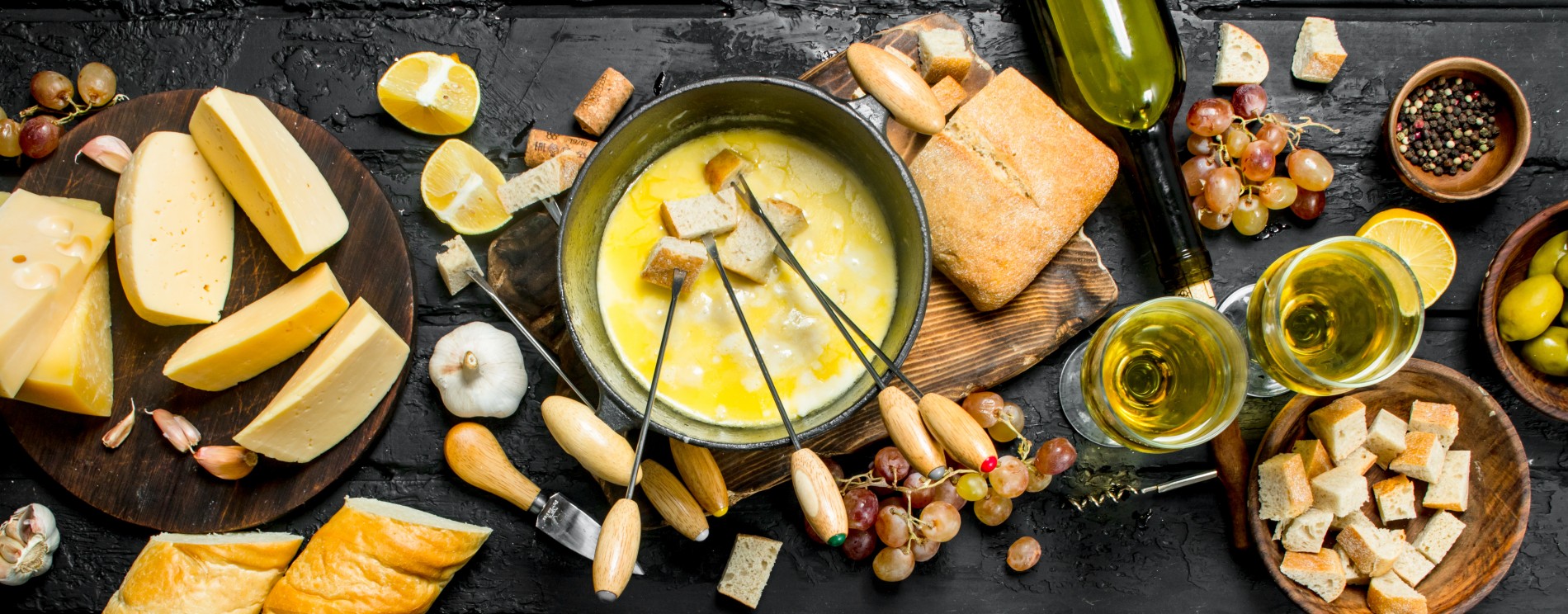
Martine's Fondue Recipe
We've called on the queen of Fondue, Martine, for this fabulous blog and her top tips for creating the perfect cheesy melting pot.


We've called on the queen of Fondue, Martine, for this fabulous blog and her top tips for creating the perfect cheesy melting pot.
Fondue had its origins in 18th century Switzerland but the word comes from the French - fondre - meaning “to melt.” It was only right, therefore, that we asked our very own European queen of cheese, Martine, for her fondue recipe and top tips.
"When Diane asked me to scribble a few words on my take on Fondue to share with you, I thought: Yeah, sure. I’ve done it often enough with customers over the years. Let’s do it!
"Oh… but no! I couldn’t just stick - even roughly - to the ideas I’ve had on the subject for the last 30 years or so. No, no, no.
"I HAD to go and dig into the Fondue world, didn’t I? Why oh why didn’t I take the blue pill? After hours bouncing around from ‘The Best Fondue’ to ‘The Original Fondue’, ‘The Proper Fondue’, ‘The Fondue Savoyarde vs the Swiss Fondue’, the neverending Franco-Swiss cheesy feuds over Vacherin, Gruyeres, Emmental, Emmentaler, Raclette, AOP, PDO, IGP …. I finally lost it!
"The hot bubbling cheese mix between my ears was about to direct you to the Group Recipes website and their Laughing Cow fondue recipe, where they make a point of warning visitors not to mistake the shiny triangle cheese with the wee red waxed one, because it would make for a very different Fondue. Indeed!
"For my own sanity, or what little was left of it, I went back to basics and our Provender Brown cheese counter. If you’ve never had Fondue before, I would say, go Swiss. 50% Gruyere, 50% Emmental. Once you’ve enjoyed that, it’s time for French fun and a whole lot of different flavours. I’ll give you 3 groups of cheeses and it’s up to you to mix and match.
Choose one from each.
"For the bread, I would strongly recommend Wild Hearth sourdough bread. The miche is very nice, but the White sourdough is even better with its nooks and crannies to capture the scrumptious cheesy mix!
"Of course, you can choose and enjoy dipping potatoes, meat cuts of all variety, raw vegetables, my favourite is gherkins. Can’t live without them! But whatever you fancy picking through, you’d better make sure it sticks and comes out of the pot. Or else, beware of the forfeits for they can be as versatile as the fondues themselves!
PS If you'd like to go the super easy route then try our Emmi Classic Fondue Packs. Ready made Fondue in boxed sachets (includes wine & Kirsh). Just heat and serve. It is surprisingly good!
Fondue comes from the French “fondre”, meaning “to melt,” but its origins are actually Swiss, going all the back to the 18th century. What is now the best way to spend a weekend night in with friends, was once a means for poor agricultural families to stretch their provisions through the winter months.
With some remaining cheese, some stale bread, and a dash of wine the family could survive the long, cold months. By dipping the stale bread in melted cheese, it became soft and delicious and so began this Swiss tradition.
The first written recipes appeared in 18th century cookbooks in France and Belgium, although strangely, they still called for Gruyère, a decidedly Swiss cheese! The widespread love of fondue followed a 1930s campaign by the Swiss Cheese Union (Schweizerische Käseunion) to increase cheese consumption in Switzerland - after which it was more frequently enjoyed by people of means!